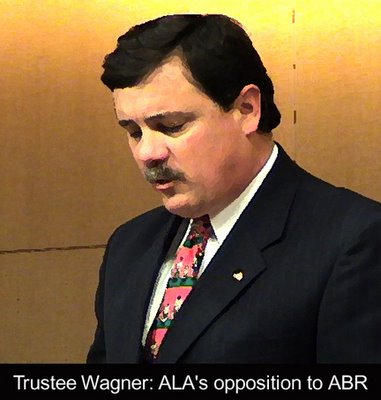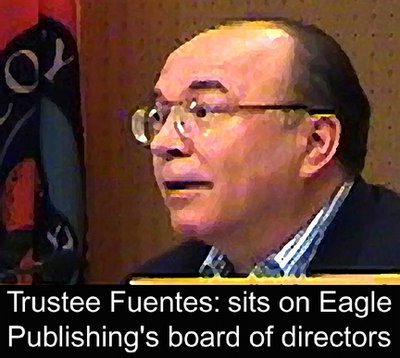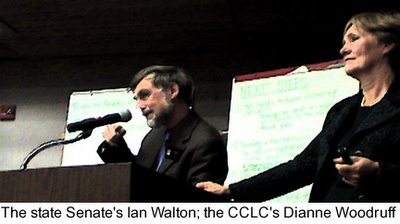
Dear Gabacho:
Q: So, what happened last night?A: Well, it was pretty groovy.
Wendy G, on behalf of the IVC Academic Senate, read a resolution to the board, asking the trustees to keep their goddam noses out of college business. She was referring, of course, to the Board's January action of discontinuing the two colleges' memberships in the American Library Association--owing, apparently, to the ALA's "liberal busybody"hood.
The resolution was pretty hard-hitting. I'll provide an audio file soon, I hope.
The board voted to approve the new contract for classified. The latter seemed very happy.
The board got an earful of a report from the usual outside experts about the master plan. These experts said that phase 1--this involves 15 years or so--would cost almost half a billion dollars, and they weren't exaggeratin' neither.
The experts, who, as always, seemed quite competent (how refreshing to be able to say that!), said we can scrape up about $155 million from the usual sources, but then we're $302.6 million short. What to do?
Gotta pursue a bond issue, they said.
Yeah, but them are fightin' words to the fiscally conservative Wagner and Fuentes. No No No No No, they said, and more than once, too. You see, they are the friend of the taxpayer, and the poor taxpayer has paid enough!
In the meantime, everybody else stared blankly into the harsh brute fact that we've gotta get this money from somewhere--if, that is, we wanna accomodate reality, and not just the fascist oldsters who watch the SOCCCD BOT show. You can yammer all you like about bonds, Satan, and taxpayers, but, in the end, you've gotta come up with the
scratch.
We need to update our IT, too, said IT maven Alan M. As it turns out, said the rumpled Alan, lots of our IT faces "end of life"--a phrase that seems to refer to the dying years of software that is so old, that the companies that produce it will no longer recognize it, like those Eskimos that send their old people out into the snowstorm.
Fuentes and Wagner went after the SANTANDER, SPAIN trip again. It's too costly; it serves only the elite, etc. People sure do go way out of their way to save face.
Everybody else seemed to say, "hey, the college and student government have scraped up all sorts of money to help out the students who can't afford the trip!" But even that wasn't good enough for the Doublemint Twins, cuz that money's comin' from
somewhere, even if it isn't coming from these students, and how come it costs so much? (It's about $5k, and that includes transportation, hotel, etc.)
So Fuentes started singing the praises of a Cypress College trip to Tijuana that costs about $2,000. (It wasn't to Tijuana, but to Guanajuato. I just wanted to say Tijuana.
Tijuana, Tijuana, Tijuana.) Dave said that Fuentes wasn't comparing apples to apples, etc., cuz the units earned and the duration weren't the same, etc. (
Cypress' Mexico program I've gotta admit: this Guanajuato place looks great. Check out the pic below. I wanna be there.)
In the end, the board approved the Santander trip, I think, with Fuentes and Wagner stinking up the stage with their rank peevitude and their general negatory theatricality.

There were lots of unpleasant and fun comments about the Accrediting recommendations. You know: stop micromanaging; deal with the plague of despair; stop acting like a "banana Republic" (I seem to recall somebody using that phrase a while back).
As per usual, but with a more explicitness, Fuentes complained about outside agencies telling the board what to do. He sounded just like the Norman Fell character--the suspicious guy who ran the rooming house in Berkeley--in the Graduate:

Proprietor: Are you a student?
Benjamin: Not exactly.
Proprietor: What's that?
Benjamin: I said 'Not exactly.' No.
Proprietor: What are ya then?
Benjamin: Oh, I'm just sorta travelin' through....
Proprietor: (He stops at one of the landings) You're not one of those agitators?
Benjamin: What?
Proprietor: One of those
outside agitators?The look on Fell's face is priceless. Fuentes had that look.
The board was nicely divided about whether they were ready to start discussing the recommendations, and, in the end, thanks mostly to the Doublemint Twins, it acted to put off this discussion, despite warnings from Wendy and Claire, et al. Fuentes blew hard about how nobody tells the
board what to do. After all, they are elected by the "good people."
This foot-draggin' won't look good to those outside agitators--um, I mean, to the Accreds. Wendy warned that we could be headed for "warning" status. Fuentes gave her the stink eye.
Kate Clark got a prize for her years of work with the Academic Senate of Cal (for about five years, including a stint as Prez).
It was a rich moment. There she was getting all this praise--with Raghu Mathur standing immediately behind her. I'm told she refused to shake his hand, but I'm not sure about that.
Years ago, Raghu, then President of IVC--and recent recipient of his first massive vote of "no confidence"--accused Kate, Bob D, and me of sending him "mail threats." He didn't have a shred of evidence: he just
said it. That's the Raghu way.
The board responded by giving Mr. Goo a "security allowance."
Years later, when the fellow was deposed in connection with my 1st Amendment suit, it came to light that, despite Mathur's reference to about a dozen mail, email, voicemail,
threats, he hadn't kept any of these supposed artifacts. I mean, if you were sent threatening mail, wouldn't you keep it?
It was pretty clear that there was nothing to keep: Raghu had simply made it all up.
There was quite a discussion about the American Library Association. It turns out (said Bill J) that Laura Bush and her stupid husband too (maybe) are members of the ALA. When Bill says "maybe" I think that means "not."
That the INCREDIBLY POPULAR First Lady is a member of ALA didn't deter Mr. Fuentes from going on and on about "pornography." The ALA, he seemed to suggest, wants to show kids
pornography, right here in our libraries. Every time he said that word, he seemed to live in it. Everyone was transfixed in horror. It was like listening to Pamela Anderson roll her tongue and lips around the word "breast." --Well, it wasn't that good.
In the end, Wagner and Fuentes managed to put off the ALA discussion until next time. So this issue
lives.
As I left, a classified employee noted Fuentes' awful way with S's. It's disgusting, she said.

"Yeah, it's reptilian," I responded.
Later, I felt bad for saying that. What did snakes and gila monsters ever do to
me?
















































